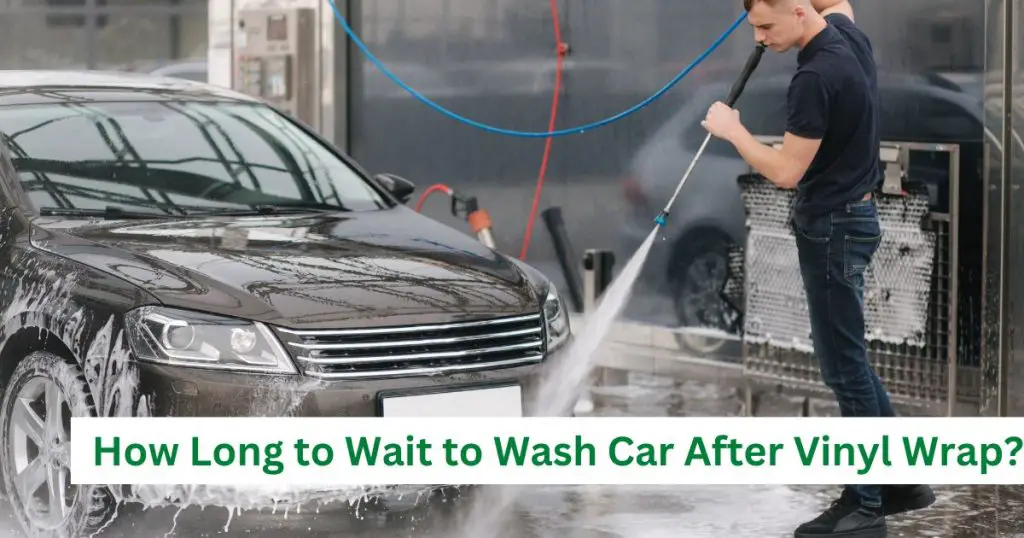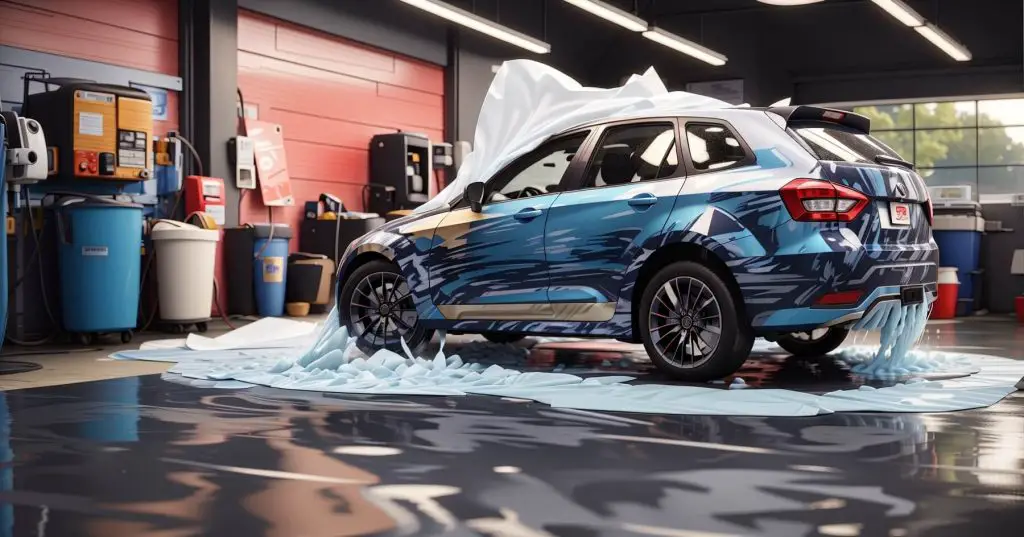It is generally advised to wait at least 48 to 72 hours before washing a vehicle that recently had a vinyl wrap applied. It gives the glue on the wrap time to fully cure and adhere to the car’s exterior.
If you wash your car too quickly after the wrapping is put on, the force of the water, as well as the friction of the tools for washing (such as washing cloths or sponges), could result in the wrap becoming loose or falling off prematurely.
It is also important to use a gentle method of washing your car with a vinyl wrap. Avoid powerful water jets and harsh chemicals; use a soft, clean washcloth or sponge to clean the surface gently. It can help avoid injury to the wrap and ensure that it remains in a position to the maximum extent possible.

Can You Take a Wrapped Car Through a Carwash?
It is generally safe to take a wrapped car through a car wash as long as the car wash is a soft cloth or brushless type. These car washes use high-pressure water and soap to clean the car but has no physical brushes or other abrasive elements that could potentially damage the wrap.
So, it’s essential to be cautious in putting a wrapped vehicle through the car wash. Certain car washes use high-pressure settings, which may cause damage to the wrap or utilize harsh chemicals that could cause discoloration or fading. To reduce the risk, you should select a car wash that specifies the safest use method on wrapped cars.
Can you power wash vinyl wrap?
Yes, you can power wash a vinyl wrap, but caution is needed. Use a low-pressure setting (around 2000 PSI or less) and maintain a distance of at least 12 to 18 inches from the wrap. Avoid aiming the pressure washer directly at seams, edges, or corners of the wrap, as excessive pressure could cause lifting or peeling. It’s generally safer to opt for hand washing or a brushless car wash to ensure the longevity of the vinyl wrap.
Cleaning products for wrapped cars
When it comes to cleaning wrapped cars, it’s important to use products and methods that won’t damage the wrap’s surface or its vibrant appearance. Here are some cleaning products and guidelines to consider:

- Microfiber Cloths: These are gentle on the wrap’s surface and help prevent scratches. Use them for both washing and drying.
- pH-Neutral Car Wash Soap: Look for a soap that’s specifically formulated for vehicles. Avoid harsh detergents that can degrade the wrap’s protective layer.
- Bucket and Grit Guard: Use a clean bucket with a grit guard to prevent dirt and debris from being transferred back onto the car’s surface during washing.
- Hose or Pressure Washer: Use a gentle stream of water to pre-rinse the car and loosen dirt before washing.
- Soft Bristle Brush or Wash Mitt: If you need to scrub gently to remove stubborn dirt, use a soft bristle brush or a wash mitt designed for car washing. Avoid abrasive brushes or sponges.
- Spray Nozzle: For the final rinse, use a gentle spray nozzle to remove soap and debris. Avoid high-pressure settings that could damage the wrap.
- Spray Detailer or Quick Detailer: After washing, you can use a spray detailer to give the wrap a quick cleaning and enhance its shine. Make sure the detailer is safe for wraps.
- Wrap-Specific Cleaning Products: Some manufacturers produce cleaning products specifically designed for vinyl wraps. These can be a good option, as they are formulated to maintain the wrap’s integrity.
- Isopropyl Alc**hol (IPA): Diluted isopropyl alc**hol (70% concentration or lower) can be used sparingly to remove stubborn contaminants, but avoid excessive use as it can degrade the wrap over time.
- Wax and Sealants: Some wraps can benefit from a wrap-safe wax or sealant to enhance their appearance and provide additional protection. Make sure the product is labeled safe for vinyl wraps.
- Lint-Free Towels: Use lint-free microfiber towels for drying and applying products to avoid leaving fibers on the wrap.
- Avoid Harsh Chemicals: Stay away from products that contain acetone, ammonia, or petroleum-based solvents. These can damage the wrap’s adhesive and coloring.
Can bird droppings or tree sap damage the vinyl wrap?
Yes, bird droppings and tree sap should be removed as soon as possible. They can potentially stain or damage the vinyl wrap if left for an extended period. They can also casue water spots on car surface. Use a gentle cleaner and a soft cloth to remove them.
Are there specific soaps I should use for washing a vinyl-wrapped car?
Use a pH-neutral, non-abrasive automotive soap. Avoid using strong detergents, solvents, or abrasive cleaners as they can damage the vinyl and its adhesive.
Is it safe to use a microfiber cloth on the vinyl wrap?
Yes, microfiber cloths are safe for cleaning vinyl wraps as long as they are clean and free of debris that could scratch the surface.
What’s the recommended method for washing a vinyl-wrapped car?
Hand washing is the preferred method for cleaning a vinyl-wrapped car. Use a mild soap and a soft microfiber cloth or sponge. Avoid abrasive materials and harsh chemicals that could damage the wrap.
Can I use an automatic car wash on my newly wrapped car?
It’s best to avoid automatic car washes with brushes for the first month after getting a vinyl wrap. Brushless car washes or hand washing are safer options to prevent any potential damage to the wrap.
How long does it take for vinyl wrap to cure?
The curing process for a vinyl wrap typically takes about 1 to 2 weeks. During this time, the adhesive bonds securely to the surface, ensuring a durable and long-lasting application.
Why is my wrap peeling off?
There are several reasons why your vinyl wrap might be peeling. One common cause is improper application, where the wrap wasn’t adhered correctly. Additionally, using a pressure washer too closely or with high pressure can lead to peeling. Environmental factors like extreme heat or cold can also affect the adhesive. To prevent peeling, ensure proper application, avoid aggressive pressure washing, and maintain a suitable environment for your vinyl wrap. If peeling occurs, consult a professional for advice on repair or reapplication.